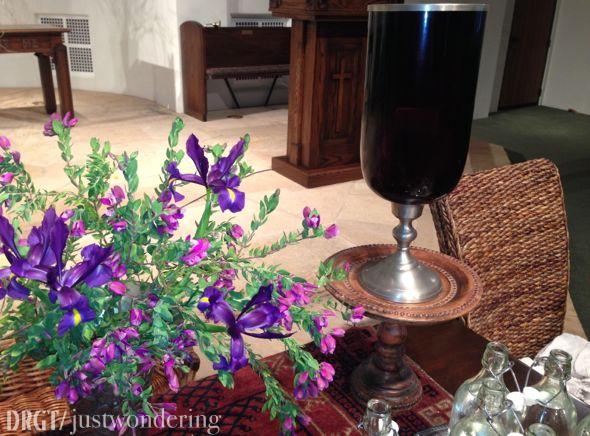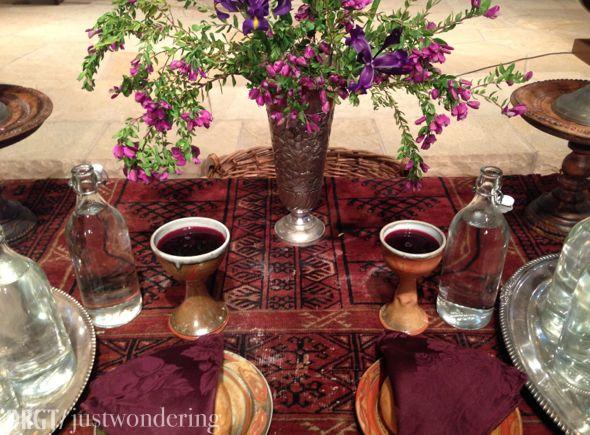Meditation for Maundy Thursday
Diana R.G. Trautwein
March 28, 2013
Exodus 12:1-4, 11-14; Psalm 116:1-4, 12-17; I Corinthians 11:23-26; John 13:1-17, 31b-35
This is a strange day, in the midst of a strange week, in the midst of a very strange story. This story of ours, the one we know so well, and yet not at all; this story, which if I let it do its work, well. . . it just knocks the breath right out of me.
It’s a hard story and a beautiful one, a story that demands response, that can’t be entered into partially, that carries import we cannot always see. It’s a story told over time, lots and lots of time, and it’s a story that is never really over, at least as long as this old globe keeps spinning around the sun. Because we can choose to believe it every day — to tell it every day, to live it every day, to let it live us, live in us. We, such ordinary, falling-down, messing-it-up disciples — yes, we can choose to let this story be told through our everyday lives.
And tonight’s gospel message, piled on top of that Exodus reminder about a long-ago foundational event in the plot; embellished by the lyrical words of the psalmist-poet; set right up against Paul’s indelible record about the beginnings of our sacramental table — this story from John about finishes me. Because it is John’s vignette, his telling about Jesus loving his friends ‘to the end’ — a line which I love and why I changed the translation for tonight’s reading — it is this story that makes Holy Thursday holy; it is John’s story that makes this day Maundy Thursday.
Such a strange word to our ears, Maundy, and no etymologist has completely nailed down its origin. The likeliest way we got this adjective is this: the Latin word for ‘commandment’ is mandatum which by some process of evolution became Maundy in English.
This is the day in which Jesus gives his disciples a ‘new commandment.’
This is the day in which Jesus models that commandment to the ragged band of followers gathered round the dinner table with him.
This is the day when Judas sneaks off into the night to begin the undoing process.
This is the day and the night when Jesus eats and drinks and touches and loves and prays.
This is the last time that Jesus is a free man.
John’s gospel never speaks of a ‘last supper’ like the other gospel writers do, so chapter 13 is the closest thing we’ve got. There is no mention of bread and cup in this passage. There is no admonition to ‘remember.’ Instead, there is a strong visual aid and there are these words:
“For I have set you an example, that you also should do as I have done to you. Very truly, I tell you, servants are not greater than their master, nor are messengers greater than the one who sent them. If you know these things, you are blessed if you do them.”
Even on the last night of his life, Jesus is beating the same drum: hearing is good, doing is better; knowledge is good, doing is better. If the story is to be told, it has to be lived.
This is the piece that we need to grapple with every.single.day, isn’t it? And, I am so sorry to say, this is the part that just stymies me all the dang time. Because there is a big, big difference between knowing and doing. There is a big, big difference between knowing about love and loving.

And most of us, if we’re truly honest, most of us cringe at the picture of love which is drawn for us around this dinner table in chapter 13. What Jesus does here is shocking, startling, unexpected, even unwelcome. What? An act of love, unwelcome? Yes, most definitely. Jesus strips down, grabs a towel, then bends over and begins, gently but insistently, to wash the dusty feet of his friends.
Now washing feet was an everyday occurrence in 1st century Palestine. People walked everywhere. Dinner gatherings were enjoyed in a reclining position, and sleeping couches were often moved into a circle around the table full of food. Putting your dirty feet up on someone’s bed simply was not done, it was impolite in the extreme. Water, towel and basin would be provided to all, as an act of welcome, of hospitality.
For just an ordinary dinner gathering, guests would wash their own feet before climbing up onto the couch, and that is most likely what would have happened if Jesus had not grabbed that basin. If the homeowner was financially successful OR if the gathering was a truly special event, then a servant would be given this task. The host did not wash his guests’ feet. It’s a grungy, and somehow deeply personal, task, so it was given to the least personal member of the household: the servant.
For the Teacher, the Rabbi, the leader of the band, to ‘assume the position,’ to bend down and do the dirty work — well, it just was not done. It was an extremely humble — to the point of humiliating — act. And I imagine it was a humbling thing to receive as well. But here’s something you may have noticed about Jesus: he was pretty much all about doing those things that were not done.
And almost every time, he managed to re-define the socially unacceptable thing — from touching a leper to eating with a tax collector to re-interpreting the Sabbath command to honoring women and children —

Jesus was able to change the meaning, to tweak it in such a way that it could never be looked at the same way again. “Watch and learn,” seem to be his bywords. “Let me tell you the story in a new way.” And in this particular piece of the story, the action precedes the commandment. “Let me show you,” he says,” let me show you how to love one another. Then go, and do likewise.”
You know, life would be so much simpler if he had said something like, “Go and think likewise.” Or, “Go, and believe likewise.” But he did not. No, he did not. He said, “Go, and DO likewise.” And that is where the rubber meets the oh-so-resistant road in me.
Maybe in you, too?
I’ve thought about this faith stuff a lot. I’ve chosen to believe it, too. I’m constantly working on refining what I think and what I believe. But the actual doing part? Ummm. . . .not so much. That part is much tougher for me. I am impatient, I am cranky, I am judgmental, I am intolerant — with myself and with others. I do not always look for ways to ‘be the servant’ in a given situation (although I will add here that not every situation asks that of us nor is it always the best option). But. . . most of the time, in most situations, it is, and always will be, the best, the truest, the most-likely-to-line-up-with-the-story thing to do. BE THE SERVANT.
Not the doormat — Jesus initiates this action, it is not forced upon him, expected of him, or imposed in any way.
And not the disappearing act, the self-immolation thing, either — Jesus is still very clearly himself in this scene; he has strong words for Peter; he uses the moment as a teaching point; he never denies who he is.

Rather, he re-defines who he is:
I am the teacher who is also a servant.
I am the Lord who is also your slave.
These are not mutually exclusive categories;they are beautifully complementary — indeed, they are two sides of the same shining coin. It seems that LOVE is often best seen in humility and TRUTH can be better understood in the context of compassion. The story is told, the story is lived when we learn about and live into loving one another.
THIS, Jesus says, is how people will recognize you. This is your calling card in the world.This is how the gospel will be most effectively spread — when you love one another. Not when you ignore one another; not when you ask and answer the perfunctory, “Hi, how are you?” “Oh, I’m fine, just fine;” not when you browbeat one another; not when you pick and choose doctrines to use as weapons; not when you make it about outsiders and insiders; not when you demand a detailed statement of faith, with all the i’s dotted and the t’s crossed; not when you spout any kind of party line about anything. NO. The world will know you are mine if you love one another as I have loved you.
Pope Francis had this to say in his Maundy Thursday homily earlier today:
“Help one another. This is what Jesus teaches us. This is what I do. And I do it with my heart. I do this with my heart because it is my duty, as a priest and bishop I must be at your service. But it is a duty that comes from my heart and a duty I love. I love doing it because this is what the Lord has taught me. But you too must help us and help each other, always. And thus in helping each other we will do good for each other.” — Pope Francis, Holy Thursday homily
Now, that, my friends — THAT is a story. Amen.

Tonight we are going to invite you to do a couple of new things, things that we believe will help us to put flesh on this story from John’s gospel. You can see this magnificent table configuration that Jeanne Heckman has put together for us. On either side of the large table, are two smaller ones, with large basins on board. And here are some beautiful bottles, filled with water.
It seemed to us that people in California in the year of our Lord, 2013, don’t walk a lot of places. Oh, we take walks, with special shoes and clothes, but we don’t generally walk in open sandals from Goleta to Montecito. We do, however, use our hands for a lot of different tasks, some of them quite grungy in nature. And we tend to wash these hands of ours a lot. And, unless we are quite small or quite infirm, we always do it for ourselves. So, following the example of Jesus, we want to invite you, on this special night, to come to the Table of the Lord with clean hands, and to let someone else do the washing.
There will be friends here, your servants for this evening, three on each side. One will pour the water over your extended hands, the other will dry them before you come to take the bread and dip it into the cup offered to you by servant number three. You are invited to come down the center aisle, then peel off to the left or the right, extend your hands, and accept this ministry of water and reconciliation and love. Then you are invited to partake of the Lord’s Supper by tearing the bread and dipping it into the cup. You may return to your seats by going up the side aisles.
Joining with Jennifer and Emily this Thursday night.




























